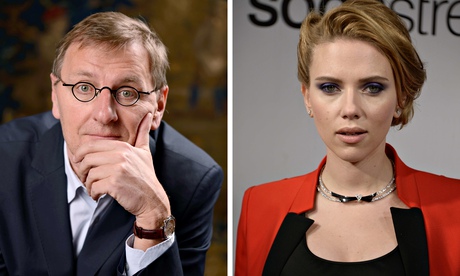
Jude Law, Bradley Cooper and Bruce Willis are among a growing number of A-list names lining up to take advantage of sympathetic European privacy laws in French courts.
So far it's a trickle rather than a torrent, but the trend is there, according to French lawyer Christophe Bigot.
The most recent case involved Scarlett Johansson, who last week won a defamation suit against the bestselling French novelist Grégoire Delacourt. The Hollywood actor claimed €50,000 (£40,000) in damages over a fictional character who is a Johansson lookalike and comes to a sticky end. The judge found that the book had made false claims about her private life, but awarded her only €5,000 in damages and costs.
Other Hollywood stars, including Jude Law, Bradley Cooper and Bruce Willis, have filed similar suits in the last couple of years over articles in celebrity magazines based in France but with a global reach because of the internet.
If a celebrity can prove that their "centre of interest" lies in France, even without being domiciled in the country, they can claim damages worldwide, Bigot told the Guardian. But those without such a territorial link can only seek compensation for France, which results in less significant financial rewards, with penalties generally ranging from €2,000 to €9,000.
Bigot fought on the side of tabloid titles in a case brought by Olivier Martinez, the former boyfriend of singer Kylie Minogue, whose privacy complaint was taken up by a French court despite the fact that the French actor was based in California.
Under a 2011 decision by the European court of justice, individuals can sue internet publishers in each country where the information can be accessed. But celebrity complainants have migrated to France because of its notoriously strict privacy laws – and French lawyers have been only too happy to represent them.
"We call it forum shopping," said Bigot, who has defended the tabloid magazines Ici Paris and Public.
The phenomenon has been compounded by the fact that French celebrities are notoriously litigious, which has discouraged paparazzi, who have increasingly focused on foreign targets.
Luc Brossollet, lawyer for Prisma press, the second largest publisher of magazines in France with titles such as Gala and Voiciaccused stars of "real hypocrisy" in Nouvel Observateur. "The stars sue in France for information distributed in the same format in Spain, Germany and elsewhere," he said. "Do they sue in those countries?"
Julie Gayet, revealed by Closer magazine to have been President François Hollande's former mistress and who has sued the weekly for invasion of privacy, has already won ¤15,000 damages in civil court and is awaiting a ruling in September on a criminal case. The actor is seeking a symbolic penalty of ¤1. Closer is the same French magazine which caused outrage by publishing topless photos of the Duchess of Cambridge in 2012.
An editor on one of the showbiz magazines said that civil cases were always more profitable for celebrities than criminal lawsuits, which were unlikely to result in prison terms and tended to have more of a symbolic value. A weekly like Paris Match or Closer can usually shrug off a fine, given the increase in their circulation from a celebrity scandal.
About 10% of cases before the two French courts in Nanterre and Paris specialising in privacy issues now concern foreign stars, according to Bigot.

